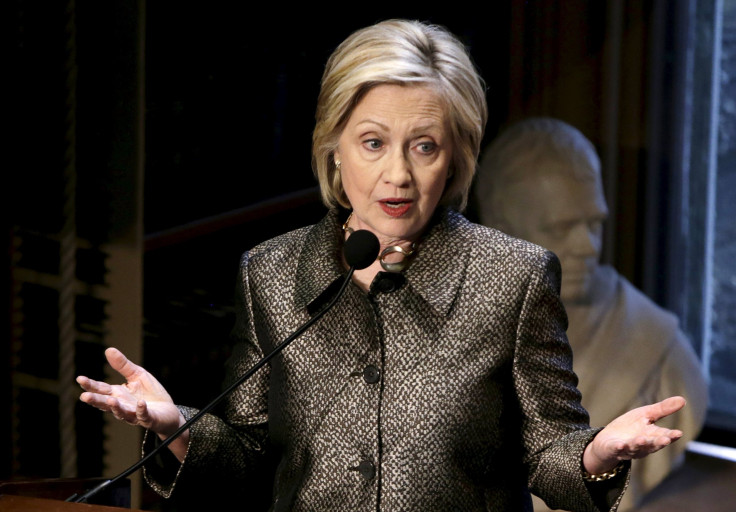Hillary Clinton 2016: Will Questions About Family Foundation Lead Other Democrats To Challenge Hillary?

WASHINGTON -- Democrats concede that donations to Hillary Clinton's family foundation from foreign governments, examined in a recent spate of articles and a new book, don't make her look good. They’re grumbling about her weaknesses as a 2016 presidential candidate and fretting that she could be undone in the next year by a barrage of bad stories that are undoubtedly on the way.
But aside from the handful of long shots who were already starting to build 2016 campaigns, there hasn’t been much movement inside the party to find a serious challenger to Clinton. Several of the Democrats likely to run -- like former Maryland Gov. Martin O'Malley and former Virginia Sen. Jim Webb -- don't smell blood in the water, yet. If they did, they'd be speaking out against Clinton's family foundation and her secret emails, as Republican candidates are.
“This stuff is not going to stick and no one is going to pay attention once we get closer to the election,” said Jim Manley, a Democratic strategist. “Republicans are bound to overreach.”
Voters haven’t given up on her yet either. Clinton still holds a sizable lead in a hypothetical field of Democratic candidates. A Quinnipiac University poll released Thursday found her with the support of 60 percent of Democratic voters. A CNN poll this week put Clinton at 69 percent -- what would seem a nearly insurmountable lead.
Republicans have taken to mocking Democrats for the party's lack of challengers. If the strength of a party is measured by the length of a primary ballot, Republicans -- with about 20 potential candidates -- are certainly winning. Democrats counter that they have quality, not quantity, and that the overwhelming consensus behind Clinton is what keeps other qualified applicants from jumping in.
But ongoing questions about the foundation could change the equation. “Add to that continued unease regarding Hillary Clinton's vote for the Iraq war and what's perceived by some as her cozy relationship with big corporations, and it seems the door is opening for another high-profile Democrat to enter the race,” said University of Iowa political science professor Timothy Hagle. “I've long said that Hillary Clinton has a lock on the Democratic nomination unless she seriously stumbles and others, particularly [Sen. Elizabeth] Warren, are willing to get into the race and really compete for the nomination.”
In the same Quinnipiac poll released Thursday, Vice President Joe Biden was the top second choice of Clinton supporters when polled about the primary -- capturing 40 percent of her backers. The poll didn’t ask about Warren, who has repeatedly said she has no interest in being a candidate.
Biden has been more coy. He's run twice before, and it's obvious that if Hillary were not in the picture, he would like to try again. But he isn’t building a team or urging donors to hold off contributing to Clinton: Those would be telltale signs that he might get in the race.
Several other Democrats are making a bit of noise. Lincoln Chafee -- a former senator and governor from Rhode Island who has been a Republican, then an independent, and is now a Democrat -- spoke to the New York Post about the foundation's ties to foreign governments. The Clintons “have a long history of gray areas on ethics,” Chafee said. “It goes way back to Whitewater and just seemed to never stop." O’Malley, meanwhile, has used the recent trade debate as a chance to get attention for his policy views.
If Clinton's candidacy did collapse, Democrats do have other options. There are several candidates who are current or former governors -- Kentucky’s Steve Beshear or Montana’s Steve Bullock. Former Massachusetts Gov. Deval Patrick’s name has been floated, though the announcement last week that he’s joined Bain Capital, the firm strongly associated with Mitt Romney, would be a liability.
There are also senators who could build a campaign: Minnesota’s Amy Klobuchar, New Hampshire’s Jeanne Shaheen, New York’s Kirsten Gillibrand, and Mark Warner and Tim Kaine from Virginia. Sherrod Brown, from Ohio, represents a crucial battleground state. Democrats could even get creative and tap someone like former U.S. Surgeon General Richard Carmona, who ran unsuccessfully for the Senate in Arizona.
Clinton remains the undisputed leader. But her Republican foes aren't the only ones assessing her vulnerability. Her fellow Democrats are watching just as closely.
© Copyright IBTimes 2025. All rights reserved.






















